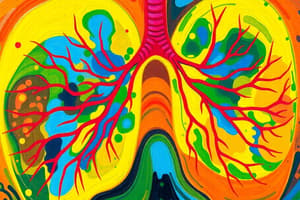Podcast
Questions and Answers
What is the primary purpose of osmosis in biological systems?
What is the primary purpose of osmosis in biological systems?
- To release energy from glucose
- To facilitate photosynthesis
- To equalize concentrations across a membrane (correct)
- To transport nutrients throughout the body
Which process describes the exchange of CO2 and O2 in plants?
Which process describes the exchange of CO2 and O2 in plants?
- Cellular Respiration
- Transpiration
- Gas Exchange (correct)
- Translocation
What effect does wilting have on a plant?
What effect does wilting have on a plant?
- It promotes cellular respiration
- It increases transpiration
- It enhances photosynthesis
- It slows down transpiration (correct)
Which type of respiration occurs without oxygen?
Which type of respiration occurs without oxygen?
Which of the following best describes translocation in plants?
Which of the following best describes translocation in plants?
What is the primary role of the gastrovascular cavity in animals?
What is the primary role of the gastrovascular cavity in animals?
During what process do plants convert glucose into energy?
During what process do plants convert glucose into energy?
Which substance must be disposed of by both plants and animal cells?
Which substance must be disposed of by both plants and animal cells?
What mechanism do plants use to reduce water loss during wilting?
What mechanism do plants use to reduce water loss during wilting?
Which system regulates homeostasis through feedback mechanisms?
Which system regulates homeostasis through feedback mechanisms?
Flashcards are hidden until you start studying
Study Notes
Learning Unit Overview
- Title: Organismal Biology Part 2
- Duration: 8 hours
- Focus: Gas Exchange, Transport/Circulation, Nervous System, Sensory Mechanism, Immune System, Endocrine System, and Feedback Mechanisms in plants and animals.
Learning Outcomes
- Compare and contrast gas exchange, transport/circulation, and feedback mechanisms in plants and animals.
- Explain and describe the nervous system and sensory, immune, and endocrine systems in animals/vertebrates.
Key Vocabulary
- Gas Exchange: Exchange of carbon dioxide (CO2) and oxygen (O2) via stomata in plant leaves; essential for photosynthesis.
- Osmosis: Movement of solvent molecules through a semipermeable membrane from low to high concentration, equalizing concentrations.
- Cellular Respiration: Chemical process that converts glucose into energy (pyruvic acid), can be aerobic or anaerobic.
- Aerobic Respiration: Energy release from glucose in the presence of oxygen; formula: glucose + oxygen → carbon dioxide + water + energy.
- Anaerobic Respiration: Energy release from glucose without oxygen; occurs through incomplete degradation of organic food.
- Transpiration: Evaporation or diffusion of water from mesophyll cells in leaves.
- Wilting: Occurs due to water scarcity; plants slow transpiration to improve survival chances.
- Translocation: Movement of photosynthesis products through the phloem vascular tissue.
- Gastrovascular Cavity: Organ structure facilitating digestion and nutrient transport; functions as a two-way digestive tract.
Gas Exchange in Plants
- Photosynthesis is essential for producing complex molecules in plants, primarily occurring during the day when light energy is available.
- Requires a supply of CO2 and mechanisms for releasing O2, which is a byproduct of the photosynthesis process.
- Plants perform cellular respiration both day and night, needing to manage excess CO2 similarly to animal cells.
Studying That Suits You
Use AI to generate personalized quizzes and flashcards to suit your learning preferences.




